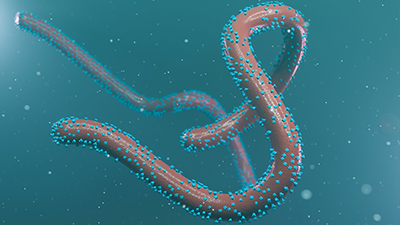By Sohini Roy

Marburg viruses cause a hemorrhagic fever in humans, with a fatality rate of up to 90 percent. Currently, Marburg disease can neither be prevented by a vaccine nor therapeutically treated.
Understanding how the immune system of a MARV survivor reacts against the virus can yield clues to design a treatment. With this goal, the labs of James Crowe, professor of pediatrics at Vanderbilt University,and Alexander Bukreyev, professor of pathology at the University of Texas Medical Branch, isolated a large panel of antibodies, Y-shaped proteins, from the blood of a MARV survivor. In a paper published in Cell Host and Microbe, they report the functional properties and therapeutic potential of two of these antibodies—MR228 and MR235.
Both MR228 and MR235 bind to a glycoprotein — a protein with attached carbohydrates — on the viral envelope, the outermost protective layer of the virus. Unlike neutralizing antibodies, which can directly bind to and kill a virus, MR228 and MR235 cannot independently neutralize the virus. However, these two “non-neutralizing antibodies” possess unique properties that, in conjunction with the body’s immune system, can thwart MARV infection.
MR228 provided complete protection (100 percent survival) in mice and partial protection (40 percent survival) in guinea pigs infected with a lethal dose of MARV virus. The researchers learned that when MR228 binds to MARV glycoprotein, its Fc region — the tail of the Y of the antibody — binds to cognate Fc receptors on neutrophils and monocytes, which induces them to “eat” and clear the virus. MR228 also activated natural killer cells.
In vitro, MR235 also exhibited Fc receptor-mediated effector functions and activation of NK cells. After binding, MR235 rearranges and opens to MARV glycoprotein. This conformational change allows easy access for other, neutralizing antibodies that developed in the host in response to the virus to directly bind and clear the virus more efficiently.
To date, neutralizing antibodies have mostly garnered attention of scientists in their search for effective vaccines or treatment for MARV infection. This study highlights the importance of non-neutralizing antibodies that likely play a protective role during MARV infection in humans. With this knowledge, scientists can broaden their scopes to design “antibody cocktail” vaccines made up of neutralizing and non-neutralizing antibodies to combat MARV infections, and possibly others, in the future.
This study was supported by grants from Defense Threat Reduction Agency and the National Institutes of Health.